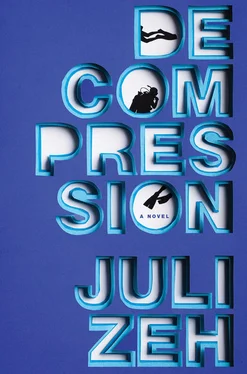“Oh, Lars,” cried the director, who’d been a little marginalized. “It’s so wonderful, the way you always bring it off!” She wasn’t referring to rising sales figures, but rather to something about dialogue and the connection between culture and politics. Shouting loudly, Theo asserted that the finance economy was the metaphysics of poker players. The twin servers circled the table tirelessly, Riesling bottles in hand. The little curls on their temples hadn’t budged an inch.
King prawns in sesame tempura, served on a cucumber bed with papaya tartare.
I wasn’t properly listening anymore. I thought about Germany, where these people lived when they weren’t sailing off the coast of Africa. I knew how they felt. They were confronted daily with the task of accommodating their own personal crises to the bank crisis, the financial crisis, the climate crisis, the energy crisis, the education crisis, the euro crisis, the pension crisis, and the Middle East crisis. For fifteen minutes in the evening, every evening, they watched people on television elucidate for them the imminent decline of the West and the inability of politicians to prevent it. Meanwhile the viewers clung to the totally private and slightly embarrassing hope that, in the end, everything would nevertheless remain as it was. Just keep on going. Their lives were wholly dedicated to keeping on going. To crossing hours and days and things to do off the list, one after another. Although the future appeared to them like the place where the coming catastrophe would be accomplished, they fought their way doggedly through the trenches of the present. They were soldiers who’d lost their faith in victory and cared exclusively about their own survival. They didn’t desert because they didn’t know where to go. In a world without differences, there was no such thing as exile.
I looked around. The temperature was rising steadily; alcohol and candles were heating up the little salon. I felt my cheeks glowing. My shirt stuck to my back. I recognized the anxiety behind the papaya tartare. All the faces were laughing in the way I recognized from Jola: with their mouths open too wide. They all talked like Jola: emphatically, with broad gestures that put glasses and candlesticks in danger. A wave of sympathy washed over me, flipped me around, ebbed away, and left behind a sandy feeling of love for the people at the table.
“It’s too bad you can’t fondle wine,” Theo cried. He’d been watching me the whole time I was looking over the others. Our eyes met again and again. He seemed amazingly relaxed. He clearly assumed he’d be taking Jola back to Germany with him on Saturday. I had the distinct feeling I must not allow that to happen. Bide your time , I told myself, and raised my glass to Theo. He lifted his glass as well and sent me a little nod. Jola gave back her plate practically untouched, which nobody commented on.
Cream of celery soup with chard-wrapped salmon roulades.
The evening metamorphosed into a tableau of light, heat, and noise. In my memory, the conversations around the table are covered up by loud music, something classical, somebody’s ninth whatever, but at the same time, I’m not completely sure there was any music at all. I didn’t turn down the twins’ offers to refill my glass. And Jola’s nearness intoxicated me. She kept groping me, laying her hand on my shoulder, on my arm, on my thigh. She leaned against me, and I could smell her hair. She whispered into my ear, and I could feel her breath. There was a dark red film of wine on her chapped lips. Smeared mascara ringed her eyes. She dug her fingers into my shirt while she laughed. Too bad you can’t drink a woman , I thought. During those minutes, I believed I’d never before loved anybody so much. In fact, my sympathy with the others at the table had its source in the profusion of my love for Jola. The East German singer and his faith in beer, the lady director’s strident isolation, Jankowski’s tragic perception of his own past, the young African, locked inside himself, Theo’s pretended serenity, the social-climbing Bittmann and his protein bars — all that provided an overflow basin for my feelings. My affection poured itself over them, fused them into a wedding party that had journeyed from far-off Germany in order to celebrate my marriage to Jola. The mere presence of these people made us a couple, for which service I owed them my thanks. They all moved me to tears. Jola and I, individually and together, moved me to tears. I put an arm around her and felt her soft yielding as I pulled her against me. Ever since the king prawns, I’d been hiding a semi-erection under the table, a reaction to the scent of Jola’s perfume. I knew what lay ahead of me. I saw Jola in my bed, in my kitchen, in front of my computer, in my living room; I saw Jola as an island resident, wearing shorts and flip-flops; I saw her talking to clients and helping run the diving school. Along the way, I’d train her to be a diving instructor in her own right, and she, Jola, would recover from Germany day by day, month by month; she, Jola, would laugh more softly and gesticulate less and become more and more beautiful. In my fantasy she didn’t give up her career, she only downsized it, and occasionally I accompanied her to Germany, where we lived in an apartment overlooking the rooftops of Berlin and went out to events in the evenings. She wore the shimmering dress and I was at her side, the same as now. Film premieres, television awards. Jola in the spotlight, and I the silent observer. People looked at me askance. Photographers took pictures of us. I smiled, unspeaking; now and then Jola pressed my hand. On the return flight, we imitated the people we’d met and laughed so much that the other passengers complained. Jola was wearing enormous sunglasses so as not to be recognized, and after we landed she said softly, “Welcome home.” One morning she’d bring me coffee in bed, gaze at me for a long time, and tell me she was expecting a child. Even that was something I could imagine.
Terrine of various fish in octopus mantle over sautéed sugar snap peas.
I started out of my reverie. Something had changed: the light, the ambient noise, the guests’ looks. I was apparently in a state of extreme sensitivity, in which I could detect the tiniest vibrations. When Bittmann began to speak of Yvette, I knew something was wrong. Or better, I knew something was going to go wrong in a second.
Yvette was such a dear, according to Bittmann. He’d known her a long time. A fabulous beauty, he said. And of course, a superb actress. Yet despite her accomplishments, she’d remained the same. Still the nice girl next door.
Maybe the movement I felt beside me was Jola, suddenly sitting up a little too straight. In any case, the noise level around Bittmann’s voice seemed to drop down so far that I could hear every word he said. The music, if in fact any was playing, fell silent. Everybody listened.
Yvette had sailed on the Dorset before, Bittmann said, and she would have very much liked to come along this time too. A good addition she would have been, because by now she was an expert sailor.
“But seasick,” the lady director cried out.
“But seasick,” Bittmann confirmed.
“Could you all please stop repeating the word seasick ?” Jankowski asked.
“But you refused my pills,” the photographer cried.
“Ingwer! Please!” cried Jankowski.
They laughed together about something that had happened on the boat a few days before. It was Theo who took it upon himself to bring the conversation back to its topic. He asked, “So why couldn’t Yvette be here this time?”
It was clear that all the guests aboard the Dorset knew the answer already. Theo too looked as though he’d been informed. Bittmann had probably told him earlier what Yvette Stadler’s present occupation was. Theo just wanted to make sure that the matter would be gone over in public one more time. When he asked his question, he was looking at Jola, not Bittmann. His face shone with pleasant anticipation. He looked like a man scarcely able to suppress his laughter. I felt Jola tense up beside me. As though her body were preparing for a life-threatening assault.
Читать дальше












